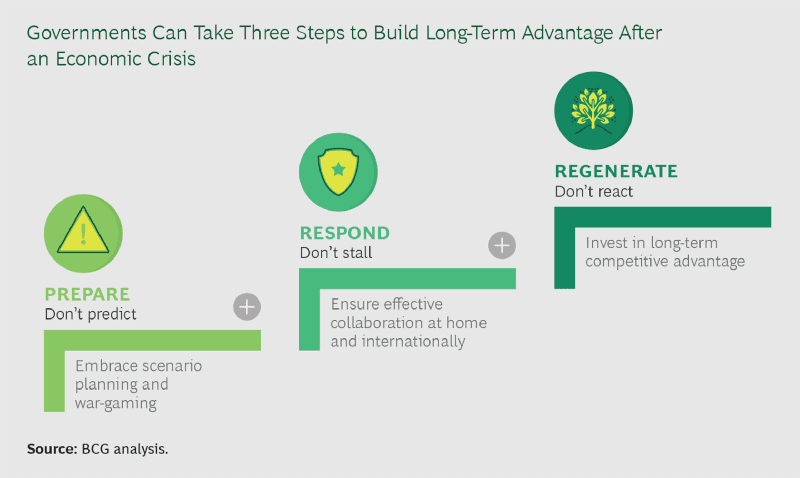By Vincent Chin , Patrick Hayden , Martin Reeves , Ruth Chiah , and Dwaa Osman

Governments are trying to read the economic tea leaves, and they are finding that they have more questions than answers. The global economy is in the midst of a synchronized slowdown, and although there are signs of stabilization, the outlook is highly uncertain. The known risks include the increasing level of high-risk corporate debt in OECD countries and the unpredictable direction of trade policy. The events that are difficult to predict, such as natural disasters and health pandemics, can also change the trajectory of the global economy with little warning.
How, then, can governments ensure that they not only survive unexpected economic hits-but also thrive? The answer lies in seeing adversity as an opportunity. Governments must take action now to ensure that they are ready not only to move quickly in the face of an economic downturn or crisis but also to act in a way that builds advantage for the long term. Specifically, governments should take three steps. (See the exhibit.)

- Prepare, don’t predict. Rather than spend more on the art of prediction, governments should invest in scenario planning and war-gaming to guide and test the robustness of their preparedness.
- Respond, don’t stall. Governments should work more effectively across traditional bureaucratic boundaries. They should design whole-of-government responses to a crisis and foster connections among rank-and-file civil servants to make the government more pragmatic and nimbler. And governments should collaborate more effectively with other governments and multilateral organizations.
- Regenerate, don’t react. Governments should use periods of economic difficulty to position their country for long-term success, and they should engage citizens in their efforts. Much as corporations must move beyond short-term, defensive responses to economic headwinds, governments can turn adversity to their advantage.
In the years ahead, governments must expect the unexpected. Those that embrace these three steps will position their country to withstand the inevitable economic shocks-and emerge from them stronger.
About the authors
Vincent Chin is a managing director and senior partner in the Singapore office of Boston Consulting Group. He leads BCG’s Public Sector practice globally. You may contact him by email at: Chin.Vincent@bcg.com
Patrick Hayden is the Global Practice Management Director for the Public Sector at Boston Consulting Group, based in the Manila office of BCG. You may contact him by email at: Hayden.Patrick@bcg.com
Martin Reeves is a managing director and senior partner in the San Francisco office of Boston Consulting Group and the Chairman of the BCG Henderson Institute. You may follow him on Twitter @MartinKReeves and contact him by email at Reeves.Martin@bcg.com
Ruth Chiah is a Lead Knowledge Analyst in the Singapore office of Boston Consulting Group and a core member of BCG’s Public Sector practice. You may contact her by email at: Chiah.Ruth@bcg.com
Dwaa Osman is a Lead Knowledge Analyst in the Dubai office of Boston Consulting Group and a core member of BCG’s Public Sector practice. You may contact her by email at: Osman.Dwaa@bcg.com
About the BCG Henderson Institute
The BCG Henderson Institute is the Boston Consulting Group’s strategy think tank, dedicated to exploring and developing valuable new insights from business, technology, and science by embracing the powerful technology of ideas. The Institute engages leaders in provocative discussion and experimentation to expand the boundaries of business theory and practice and to translate innovative ideas from within and beyond business. For more ideas and inspiration, sign up to receive BHI INSIGHTS, our monthly newsletter, and follow us on Twitter: @BCGHenderson
Originally published at https://www.bcg.com on February 25, 2020.


